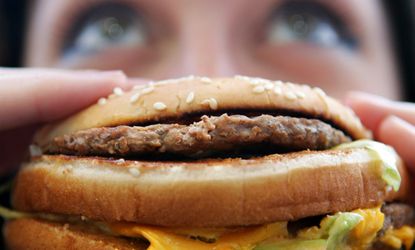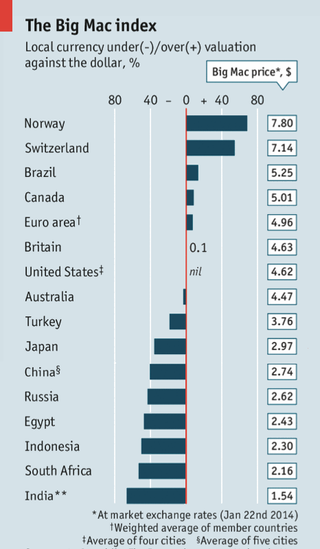What does the Big Mac Index really measure?
The cost of a Big Mac certainly says a lot about McDonald's global price structure, but currency manipulation...

The Economist is out with the latest Big Mac Index measurement. The Big Mac Index — which compares the price of the famous McDonald's hamburger in various countries around the world — was started as a joke in 1986, and purports to act as a light-hearted proxy for measuring the purchasing power of currencies around the world. The Big Mac is a homogeneous good that is sold worldwide, which makes it a plausible candidate for such a comparison.

The example that The Economist flags is that the average price of a Big Mac in America in January 2014 was $4.62; in China it was only $2.74 at market exchange rates. This would suggest that in terms of Big Macs, the Chinese yuan was undervalued by 41 percent at that time. Lots of people — including former Republican presidential nominee Mitt Romney — have charged China with manipulating their currency so that it stays undervalued. Does the Big Mac Index suggest they’re right?
Subscribe to The Week
Escape your echo chamber. Get the facts behind the news, plus analysis from multiple perspectives.

Sign up for The Week's Free Newsletters
From our morning news briefing to a weekly Good News Newsletter, get the best of The Week delivered directly to your inbox.
From our morning news briefing to a weekly Good News Newsletter, get the best of The Week delivered directly to your inbox.
I don’t think so. The costs of doing business in China and America (and any country) are very different: Different labor, land, raw material, and transportation costs. In some countries (like Iceland, which McDonald’s left in 2009) all the ingredients have to be imported; in others, they are readily available. There are different legal frameworks, security costs, and tax structures. And there are different consumers, willing to pay different prices for the same burger — in some countries McDonald’s is considered an upmarket Western taste, while in other countries it’s considered downmarket junk food. And in some countries, it’s not even the same burger. In India — which the Big Mac Index again rated as the country with the most undervalued currency (just as it did in 2013) — their Big Mac (the Maharaja Mac) is made out of chicken, not beef, to cater to India’s Hindu majority that sees cows as holy, and not for eating.
If all of these country-to-country variables could be smoothed away, then the Big Mac Index would tell us a lot about the currencies of various nations around the world. The Economist attempts an adjustment by GDP per person. The adjusted Big Mac Index for GDP per capita prices a Big Mac at roughly the same in China and America. But while this adjustment may smooth away some of the variation in labor costs, that doesn’t remove the variability of resource costs (including importation) and consumer preferences. McDonald’s is a profitable business, and if they can charge more per burger to make a bigger profit in one country than another, they will.
As it is, the Big Mac Index tells us the price McDonald’s charges for a Big Mac around the world. Which is interesting. McDonald’s is one of the most global corporations, and looking at their pricing structure across the world can tell us a lot about their business.
But in terms of telling us about the value of different nations’ currencies, the Big Mac Index — like McDonald's fries — should be taken with more than a few grains of salt.
Sign up for Today's Best Articles in your inbox
A free daily email with the biggest news stories of the day – and the best features from TheWeek.com
John Aziz is the economics and business correspondent at TheWeek.com. He is also an associate editor at Pieria.co.uk. Previously his work has appeared on Business Insider, Zero Hedge, and Noahpinion.
-
 Today's political cartoons - December 21, 2024
Today's political cartoons - December 21, 2024Cartoons Saturday's cartoons - losing it, pedal to the metal, and more
By The Week US Published
-
 Three fun, festive activities to make the magic happen this Christmas Day
Three fun, festive activities to make the magic happen this Christmas DayInspire your children to help set the table, stage a pantomime and write thank-you letters this Christmas!
By The Week Junior Published
-
 The best books of 2024 to give this Christmas
The best books of 2024 to give this ChristmasThe Week Recommends From Percival Everett to Rachel Clarke these are the critics' favourite books from 2024
By The Week UK Published